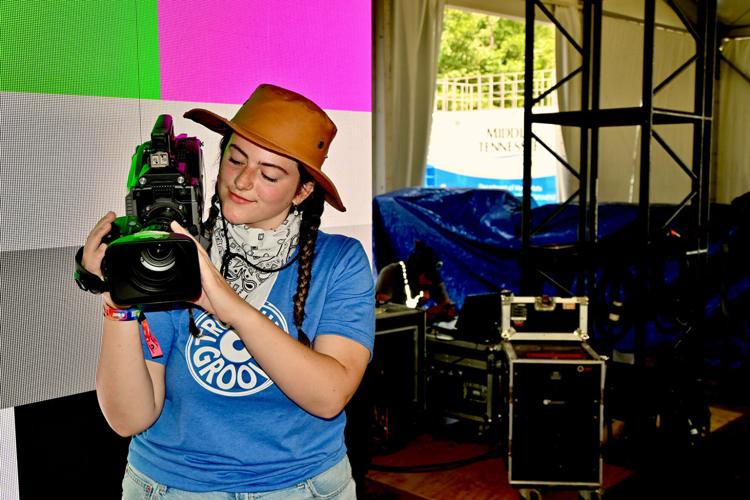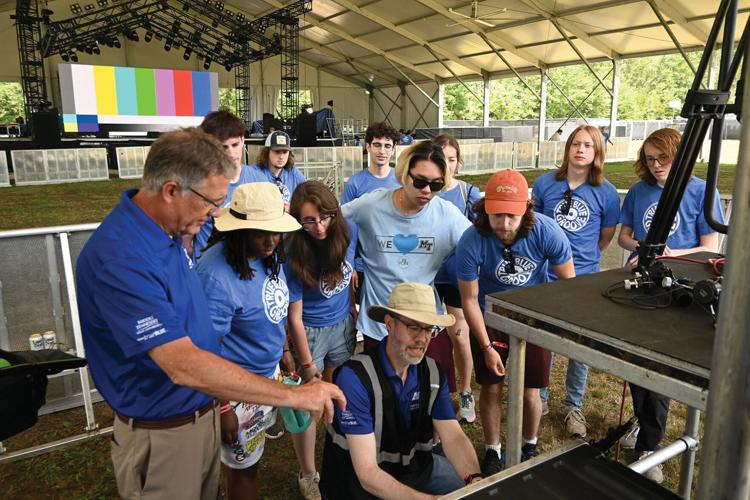
MTSU students working at Bonnaroo 2024
There’s a long-running joke that backstage at Bonnaroo is basically an alumni reunion for graduates of Middle Tennessee State University. Practically since Bonnaroo kicked off in 2002, there have been Blue Raiders involved in various capacities, both behind the scenes and onstage. Over the past decade and change, that relationship has grown much more intentional as MTSU undergrads have taken on increasingly visible roles in the production and execution of the storied festival. The denizens of the John Bragg Media and Entertainment Building aren’t just planning a weekend of fun: They are bringing all the action at The Farm to the wider world.
“We will have a truck crew, and we still have about 35 to 40 audio production students and video production students working our truck [as well as] cameras and sound for a couple of the stages,” explains Andrew Oppmann, vice president and spokesman for marketing and communications at MTSU. “We’re the primary feed for whatever stages that we’ll operate. We’ll send our feed to Hulu — so those [livestreams] will be directed by students, produced by students.”

A MTSU student working at Bonnaroo 2024
Whether you’re enjoying the festival in person or from the comfort of your couch, you’re almost certain to come into contact with audiovisual work handled by students under the direction of professor of audio production Michael Fleming and Robert Gordon, who is interim chair of the school’s Department of Media Arts and the one responsible for expanding the student production role. By and large, you’d never know whether a production was being handled by a crew of seasoned pros or a crew of MTSU students without being told.
In addition to the truck team, a group of student journalists from MTSU student publication Sidelines is headed for The Farm, captained by assistant journalism professor Matthew Leimkuehler, a Scene contributor and former Tennessean staffer. As part of a partnership established via the Seigenthaler News Service, the students produce news stories and photos for the Tennessee Press Service, whose stories get syndicated in pubs statewide. (The Scene is not a TPS member, but this year we’re also privileged to be working with this group of students. Watch nashvillescene.com for some of their work during the fest and see our pages afterward.) Besides the opportunity to get bylines in real news outlets, students are also getting firsthand experience with the very real, very difficult task of producing professional journalism out in the field while your brain sizzles in the Tennessee summer sun and all your peers start to smell funny.
“Matthew runs a journalism class that’s composed of training people to do the work — and then actually doing the work at Bonnaroo,” Oppmann says. “And then on the truck side, the same goes for them. There’s somebody doing audio production, there’s somebody doing the video production. They’ll select student leaders to serve in different roles. And it’s competitive.”
While the early days of Bonnaroo certainly helped some undergraduates get their footing in the industry, having major brand names like Hulu or Live Nation on your CV before you’ve got a diploma is huge. Free Speech Center director and local media champion Ken Paulson played a major role in establishing the official relationship with the festival while he was the dean of the College of Media and Entertainment. These days Beverly Keel — the college’s current dean, as well as a longtime journalist, professor and absolute industry legend — is helming the program as it grows.
More than just earning class credits, students who participate get genuine opportunities to learn and use real-world skills out in the real world; the fact that they keep getting welcomed back is a testament to the effort they put in. Nothing quite tests your mettle like working in actual field conditions, especially when the field is as overstimulating as Centeroo; writing a review of a five-band bill at The Boro — or running sound for one — this ain’t.
“They’ll leave Bonnaroo with that cachet of, ‘Hey, I survived Bonnaroo, I did good work at Bonnaroo,’” says Oppmann. “It’s a tough thing.”
The who, what, where, when and why of CMA Fest and Bonnaroo 2025







